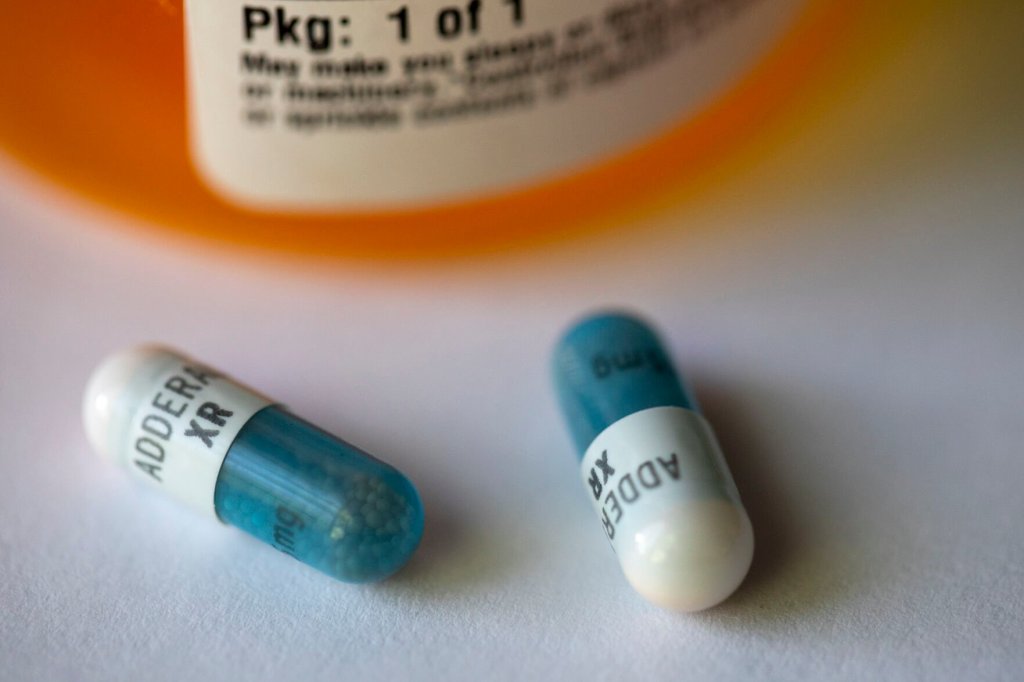Drug makers failed to make 1 billion doses of ADHD medicine approved by feds
Published 5:15 am Friday, August 4, 2023

- Adderall XR capsules are displayed on Feb. 24. A shortage of the prescription drug — used for ADHD, depression and narcolepsy — has continued for more than a year.
A shortage of 1 billion doses of medicine used to treat ADHD was caused by drug manufacturers failing to produce the full amount of medicine they were authorized to create, two federal agencies reported Thursday, Aug. 3.
A shortage of Adderall that stretched from one month to six months to almost a year has frustrated and often sickened Americans with 41 million prescriptions for medicine that they are unable to fill at pharmacies. The shortages have spread to other amphetamine-based drugs used to treat attention-deficit/hyperactivity disorder and other issues.
A joint statement by the U.S. Food and Drug Administration and the Drug Enforcement Agency, dated Aug. 1, said the shortage had several factors, including production glitches and labor problems. But the main reason for the extended delay in solving the shortfall is that drug manufacturers didn’t use the quotas they were given.
Accountability: Wyden wants feds to explain and fix Adderall shortage
Shortage continues: Adderall shortage hits six months with no sign of solution
“Based on DEA’s internal analysis of inventory, manufacturing, and sales data submitted by manufacturers of amphetamine products, manufacturers only sold approximately 70% of their allotted quota,” the statement said.
That is the equivalent of about 1 billion doses. Since last summer, patients have complained of being unable to fill prescriptions for Adderall and other amphetamine-based medicines. The shortages began showing up last summer and despite statements by the FDA that the problem would be solved by the end of 2022, or the spring of 2023, the shortfalls continued. Complaints from patients, medical professionals and numerous media reports brought a barrage of attention to the actions by the two federal agencies.
Wyden pushed for answers
The admission Thursday of the size of the shortage came only after repeated criticism by U.S. Sen. Ron Wyden, D-Oregon, that the agencies were unresponsive to congressional questions and showed a lack of urgency and candor in telling the public the scope of the problem.
“I’m glad to see it out and the clarity it provides around the quota allotment issue. It’s clear that manufacturers have work to do in easing this crisis — they need to either produce more or let other manufacturers do it, and make sure the DEA and FDA have the information they need,” Wyden said.
In the short term, Wyden said the federal agencies must act to redistribute unused authorizations to companies that can make the drugs soon.
In a separate statement, the DEA said it was prepared to “expeditiously review and adjudicate individual applications under the current authorized quota levels for amphetamine, in accordance with DEA regulations.” It included a letter sent to manufacturers on May 18 about the shortages. The FDA also sent a separate letter to Wyden as well.
In the joint statement, the agencies said there were limits on what they could do.
“This is not a problem that the FDA and DEA can solve on our own,” the statement said. “We are urging all stakeholders to work together to resolve these shortages as quickly as possible. The FDA and DEA do not manufacture drugs and cannot require a pharmaceutical company to make a drug, make more of a drug, or change the distribution of a drug.”
Manufacturers must answer
Wyden issued a letter to manufacturers of ADHD medicines demanding they respond by Aug. 10 to his office with answers to a series of questions:
• Have you met or do you expect to meet your allotted quota amount to produce amphetamine products for 2023?
• If you will not meet the quota amount, how much of the remainder do you expect to use?
• Have you or will you commit to relinquishing quota you will not use to the DEA? If not, please explain the reasoning.
• If you have or will meet the quota, do you have excess production capacity and have you requested permission from the DEA to increase your quota allotment? If you have excess production capacity, are there other obstacles to requesting a quota allotment increase or using that capacity?
Under federal law, two different agencies with often conflicting agendas control supply and demand of Adderall and other restricted medicines.
The FDA — part of the U.S. Department of Health and Human Services — controls demand. It determines who qualifies for Adderall prescriptions, which has the generic name amphetamine-dextroamphetamine.
The DEA — part of the U.S. Department of Justice — controls supply. It classifies Adderall and determines how much can be made and sold each year.
ADHD meds require new prescriptions regularly
Adderall is listed by the U.S. Department of Justice as a Schedule II drug, which has a “high risk of abuse.” But such drugs are effective treatments for specific medical conditions.
Prescriptions for Adderall and other ADHD medicines — such as brand name drugs Concerta, Ritalin and Vyvanse — all require a new prescription every 30 days.
The FDA warned of an Adderall shortage in October, but said it would be resolved by the end of the year. It wasn’t. Reports of shortages spread across the country and were the subject of numerous media reports. But the FDA limited its comments, while the DEA was largely mute on the issue.
Wyden said he increasingly heard from constituents at town hall meetings around Oregon that getting prescriptions for themselves or their children was becoming impossible.
“ADHD can severely interfere with daily activities, including work and school,” Wyden said in April, “but stimulant medications like amphetamine mixed salts are commonly used treatments that are very effective and safe.”
Doctors and mental health advocates have said the result of the shortages has been deteriorating the health of patients, impacting their ability to work, study, and take care of their families. For children, it has meant untreated conditions that lead to problems at home and school. Patients who must call or visit several pharmacies to try — and often fail — to fill prescriptions either stop taking the medicine, self-medicate with other drugs, or seek the drug through illegal means.
Wyden said his queries about ADHD medicines have led to complaints from other constituents about shortages of other medicines, including those required by cancer patients.





